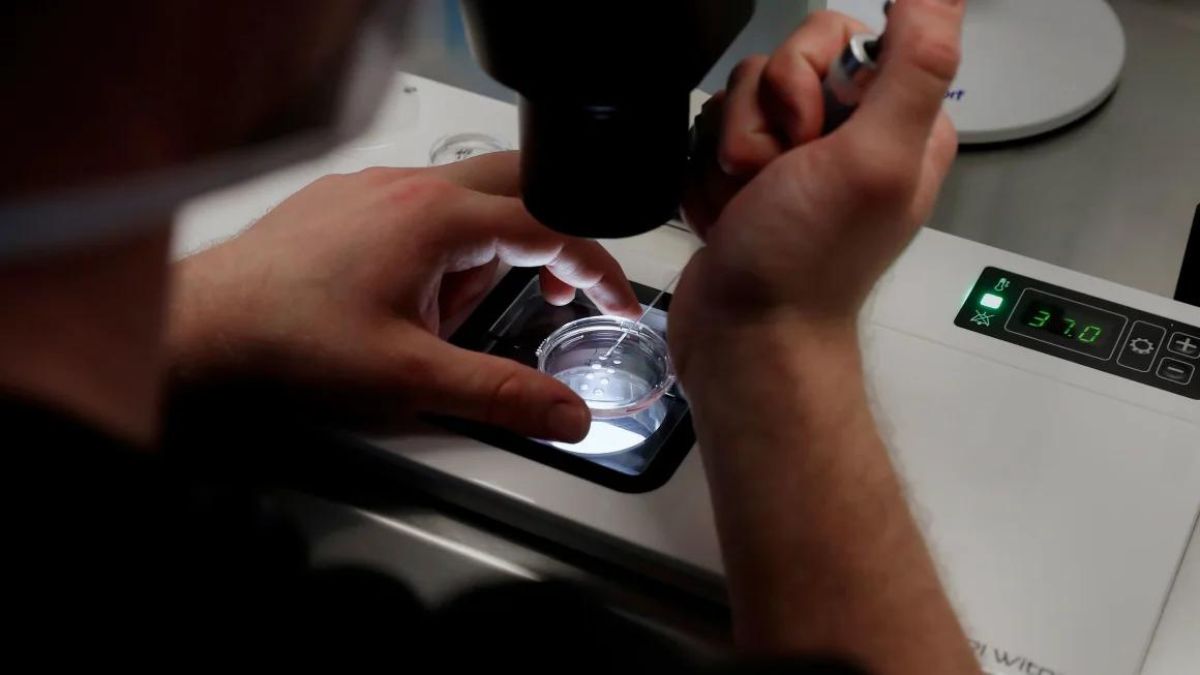Tuesday, Feb. 27, 2024, at the Aspire Houston Fertility Institute in vitro fertilization lab in Houston, laboratory staff prepare small petri dishes filled with 1-7-day-old embryos. Cells will be extracted from each embryo to determine viability.
As Democrats highlight the issue in the run-up to the November election, Senate Republicans voted Tuesday to block a bill ensuring access to in vitro fertilization nationwide.
After Republicans blocked the measure from advancing in June, Democrats brought it back to the Senate floor.
Republicans said they support IVF, but criticized the Democrat-led legislation as unnecessary overreach and a political show vote. With GOP Senators Lisa Murkowski and Susan Collins voting with Democrats to advance the bill on a procedural vote, the tally was 51-44.
As the 2024 elections approach, Senate Democrats are attempting to draw a contrast with Republicans over reproductive health care.
In August, GOP presidential candidate Donald Trump said if elected, he would require insurance companies or the government to pay for IVF treatment, so Democrats were able to put Republicans on the spot. The proposal has been questioned by Democrats as sincere.
On Monday, Senate Majority Leader Chuck Schumer urged Republicans to support the IVF bill.
The Republican colleagues are already offering the same tired, predictable, and unconvincing excuses to vote against IVF protections, Schumer said. I urge my Republican colleagues to vote for a bill that actually protects IVF according to the law if you truly support it. Republicans cannot claim to be pro-family on one hand, yet vote against IVF protection bills on the other.
John Thune, the Senate Republican Whip, was asked last week if Trump’s comments on IVF coverage make things more difficult for GOP senators.
“I don’t know of any Republicans opposed to IVF,” he said. “The mandate part is a challenging issue for many reasons, including what it does to insurance costs. Insurance companies are already burdened with a lot of mandates.”
During his conference, he said he expects “robust conversation” in response to Schumer’s move.
A bill passed by the Senate – the Right to IVF Act – would enshrine in federal law a right for individuals to receive IVF treatment as well as a right for doctors to provide it. This would override any state attempt to restrict access to IVF treatment.
By mandating coverage for fertility treatments under employer-sponsored insurance and certain public insurance plans, the bill aims to increase the affordability of IVF treatment. As part of the bill, fertility treatments, including IVF, would also be covered by the US military’s health care system.
Democratic Sens. Tammy Duckworth of Illinois, Patty Murray of Washington state, and Cory Booker of New Jersey introduced legislation on IVF.
As a result of Alabama’s Supreme Court ruling earlier this year that frozen embryos are children and those who destroy them can be held liable for wrongful death, access to IVF became national news. A decision that could chill infertility treatments, reproductive rights advocates warned.
Following the ruling, the state’s legislature took action to protect IVF; however, Democrats contend that this is only one example of how reproductive health care is under threat nationwide.
Alternate proposals are put forward by Republicans
IVF-related alternate proposals have been put forward by Senate Republicans.
Democratic Sen. Ron Wyden of Oregon objected to Scott’s bill and instead urged his colleagues to support Democrats’ bill during Tuesday’s vote.
House GOP Rep. Kat Cammack of Florida sponsors Scott’s bill. The legislation does not go as far as the Democrats’ plan to expand coverage of IVF, but it would double contribution limits for Health Savings Accounts and decouple those accounts from high deductible insurance plans to make it easier to afford the procedure.
An IVF-related bill introduced by the Senate GOP earlier this year aimed at addressing concerns. Democrats have criticized Sen. Katie Britt and Ted Cruz’s legislation, called the IVF Protection Act, arguing that the language leaves the door open to possible future restrictions. However, it does state that states that ban IVF access would not be eligible for Medicaid funding.
During Tuesday’s vote on the Democrats’ broader IVF package, Democratic Sen. Patty Murray blocked an uninamous consent request to pass Britt and Cruz’s IVF bill.
Murray said the Republican bill does nothing to protect IVF from the biggest threats from lawmakers and anti-abortion extremists throughout the country. It still allows states to regulate IVF out of existence.
Democrats previously blocked Cruz and Britt’s bill in June.
“Our bill protects IVF access while safeguarding religious liberty,” Britt said. “We are going to have a show vote when we’re talking and saying that we want to protect access to IVF, but no one is working to actually get the 60-vote threshold, so I wonder how serious my colleagues on the other side of the aisle are about this.”

Your post is really helpful and based on solid research. The material you supplied is quite beneficial, and your writing style is captivating. Your inclusion of concrete instances is quite helpful. Anyone interested in learning more about this subject would benefit greatly from reading this.